

6 Signs That You Have Developed A Good Habit. A Duke University study found that 45% of participants’ behavior was habitual, not intentional.
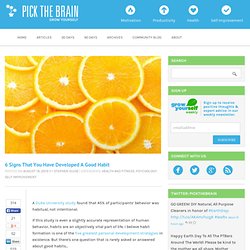
If this study is even a slightly accurate representation of human behavior, habits are an objectively vital part of life. I believe habit formation is one of the five greatest personal development strategies in existence. But there’s one question that is rarely asked or answered about good habits… How do you know when a good behavior has become a good habit? This is an important question because habits should be pursued one at a time for best results; only after you have made a behavior into a habit should you shift your focus to another desired behavior.
Exercise is a habit for me now (4-5x a week), so I can give specific examplesExercise is likely the most commonly desired good habit If some of these apply and not others, it might mean you’re getting close, but you’re not quite there yet (persevere until it’s habit!). 1. Habits are your first instinct and your brain’s preferred behavior. 2.
7 Simple "Calm-Down Phrases" That Can Blow Away Your Worst Troubles. Have you heard the popular urban legend of the space pen?
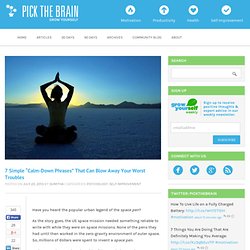
As the story goes, the US space mission needed something reliable to write with while they were on space missions. None of the pens they had until then worked in the zero-gravity environment of outer space. So, millions of dollars were spent to invent a space pen. In the meantime on the other side of the pond, the Russian astronauts faced the same problem. They however, decided to adopt a much simpler solution… they used pencils. Even though it’s an urban legend, the story is so plausible that decades after the mission to the moon, the story is still in circulation. The question I have for you is…. Are You Taking The Space Pen Approach to Life? 9 Steps to Build Your Personal Brand (and Your Career) CIO — Businesses and people from every industry are competing to sell their brand in ads, commercials, on social media and everywhere else they can, and it's time that the forward-thinking people of IT got on board.
Personal branding isn't a new topic. In fact, it's been around since roughly 1997 when Tom Peters coined the phrase, but as we slowly recover from the economic downturn and with the rise of new technology and an increase IT consulting, personal branding is becoming more prevalent and more important. Regardless of your role in IT--whether you are a CIO, a developer or a helpdesk technician-- developing and maintaining your personal brand should be a part of your long-term career strategy.
A personal brand is more than just maintaining your LinkedIn profile, according to the experts. "Good people put their head down and get caught up in their job and forget they have a whole career to manage," says 11 Profiles in Bad Leadership Behavior 1. Continue Reading. Forget Business School: Why An Emotional Education Is Indispensible. The 7 Habits Happy People DON'T Have. Your life is good.
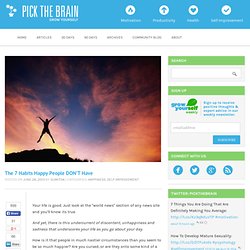
Just look at the “world news” section of any news site and you’ll know its true. 9 Qualities Of Truly Confident People. 3 Steps For Plotting Your Personal Future In An Uncertain World. In today’s accelerating world of work, it’s easy to get distracted by the million shiny objects vying for our attention.
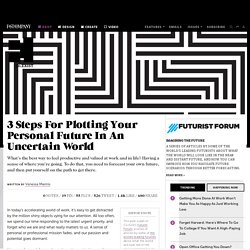
All too often, we spend our time responding to the latest urgent priority, and forget who we are and what really matters to us. A sense of personal or professional mission fades, and our passion and potential goes dormant. However, forward-focused people and organizations realize that a happy, productive workplace exists only when everyone is aware of their gifts and how to best align their contribution with a larger shared purpose. Below is a three-phase process to help get reconnected to your motivations, the unique value you offer the world, and a vision for your own long-term trajectory.
Cultivating this foresight practice at both the personal and organizational levels can be a powerful way to develop our greatest assets: ourselves. The Unexpected Antidote to Procrastination - Peter Bregman. By Peter Bregman | 9:00 AM May 10, 2013 A recent early morning hike in Malibu, California, led me to a beach, where I sat on a rock and watched surfers.
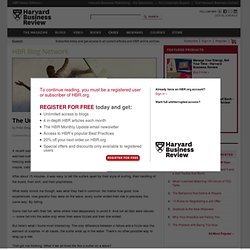
I marveled at these courageous men and women who woke before dawn, endured freezing water, paddled through barreling waves, and even risked shark attacks, all for the sake of, maybe, catching an epic ride. After about 15 minutes, it was easy to tell the surfers apart by their style of surfing, their handling of the board, their skill, and their playfulness. What really struck me though, was what they had in common. Finding out what you really want to do in life. For the past month I have been reading a book based on the life of Tulsidas, one of the greatest religious poets of India.
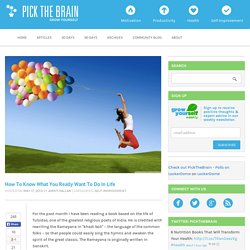
He is credited with rewriting the Ramayana in “khadi boli” – the language of the common folks – so that people could easily sing the hymns and awaken the spirit of the great classic. The Ramayana is originally written in Sanskrit. In the book there is a disciple of Tulsidas, named Benimadhav, who himself is trying to write the story of his guru but somehow he is neither able to capture the true spirit of the story he is looking for, nor focus on the divine Rama. Does Trying to Be Happy Make Us Unhappy? How to Win Friends & Influence People.